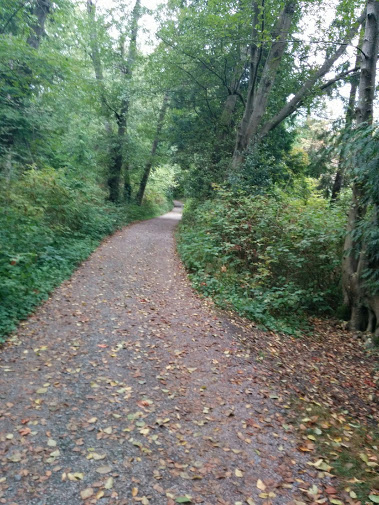Before I get into to today’s subject, eco-fiction, we have finally settled into what feels like fall after a hot, windy, dry end to the summer. I’ve been so busy at work lately that I haven’t had time to take my runs during work, so I’ve had to go afterward. Last night I met my husband at his annual company picnic in Stanley Park. It’s always a fun thing–they get a license to serve beer and wine, and their company chef oversees the salads and bbq. I decided to run along the seawall and then through a trail for a couple miles before meeting my husband, having a wine, and grabbing something to eat. He’s now worked at the place for a few years. A couple years ago we had an October Fest party, and a bunch of his coworkers came; it’s a good place to work, and the people are really cool. But of course my favorite part of the evening was being on the trail and along the seawall, where the vast gray Vancouver sky was reflected in the waters. Later we fell asleep to a torrential rainfall, and I wondered if Hurricane Hermine had come to Vancouver; it was so loud.
On to eco-fiction (sometimes used without the hyphen): It’s a category of fiction, first recognized in the 1970s, which covers all kinds of nature and environmental fiction. I’ve been working with nearly a dozen others publishers, authors, and scholars to come up with a working definition and explanation–relying on all the academic research out there–and John Yunker, author of The Tourist Trail, called it, in our working document, a super genre.
It does cover so many areas of literature, and because Jim Dwyer, the author of Where the Wild Books Are: A Field Guide to Ecofiction, said it could be both nature-oriented (non-human) and environment-oriented (human impacts on nature), it seemed like the perfect name to cover the types of books I curate at the main domain dragonfly.eco. A longer explanation is there.
I’m really not a fan of slapping one label over another on an entire work of fiction, but “eco-fiction” is a diverse super genre or category of fiction–perfect for a domain name. It is not inclusive nor stand-alone, as other genres may claim to be; it exists peacefully both laterally and umbrella-like to a host of genres. It roots are found in environmental science fiction and literary fiction, and its precursors go back to cave drawings and then branch out to Medieval European literature, Romanticism, traditional pastoralism, transcendentalism, magic realism, and even Beat “nascent environmental consciousness.” In contemporary times, that evolution has not stopped, as eco-fiction continues to attend to environmental problems of our times, such as fracking and pollution as well as consequences of our times, such as ocean acidification and climate change.
Even though my press is now publishing only novels (and environmental nonfiction) falling under this broad category, I’ve also been doing a lot of voluntary research, writing, and curating to bring eco-fiction (not just the term but the concept) into the 21st century. This includes a large database at dragonfly.eco, working with others on a modern definition and history of the word/works, interviewing authors, moderating a newsgroup, and bringing nature/environmental fiction to life.
 The “bringing to life” part is my first public presentation, outside of book fairs that are usually passive booth events. I sent a proposal to Vancouver’s Word on the Street festival organizers in January for an “Eco-fiction Stage,” and they accepted the proposal over the summer, so I’ve been working with readers in Vancouver to join in. I’m pretty excited to have Claudia Casper, Stephen Collis, Michael Donoghue, Anneliese Schultz, and Katie Welch participating (bios listed under the talent section at Word on the Street). I will also be reading from Back to the Garden. All of these authors are amazing, and I’m very excited–currently working on wildflower seedpaper props and a musical slideshow.
The “bringing to life” part is my first public presentation, outside of book fairs that are usually passive booth events. I sent a proposal to Vancouver’s Word on the Street festival organizers in January for an “Eco-fiction Stage,” and they accepted the proposal over the summer, so I’ve been working with readers in Vancouver to join in. I’m pretty excited to have Claudia Casper, Stephen Collis, Michael Donoghue, Anneliese Schultz, and Katie Welch participating (bios listed under the talent section at Word on the Street). I will also be reading from Back to the Garden. All of these authors are amazing, and I’m very excited–currently working on wildflower seedpaper props and a musical slideshow.
I’m really really excited to be working with other poets, artists, and authors who care about climate change and the ecological health of our planet–knowing full well that our species is one among many that depends on us doing the right thing. Capturing this with imagination through stories is becoming more widespread, and I’m very grateful to the Word on the Street organizers for accepting the proposal for this stage. They’ve been wonderfully accepting and helpful, and it’s good to see Vancouver as a city being progressive enough to make this a main event at a festival that draws thousands of visitors each year. What’s even more exciting is meeting others in person who I have interviewed at dragonfly.eco or worked with before. I have met all the authors now except for Katie Welch, who used to plant trees with Charlotte Gill, author of Eating Dirt. I interviewed Katie, author of The Bears, last year, and am excited to finally meet her this year.
We’ll be in the Community Garden area on Homer Street, September 25, from 11:00 am to 12:30 pm. I’ll also have a separate booth for my press from 1:00 to 5:00 that day, near the library.
